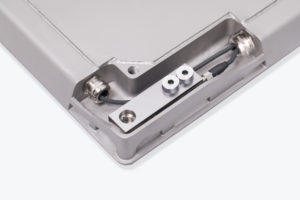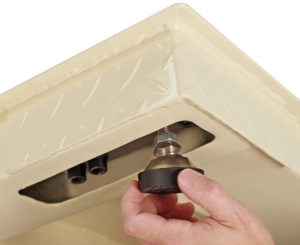How Much Does a Floor Scale Cost?

Floor scale upfront cost varies from around $500 all the way up to nearly $45,000, but these scales could cost you much much more over the life of the scale. So how much does a floor scale cost and why should you spend twice the amount for “just a floor scale?” The main answers are accuracy and durability. As with most pieces of industrial equipment, the higher upfront cost will give you a longer lasting, more durable product.
DURABILITY: Why Footing Systems Matter?

Example of Threaded Footing System
Most consumers overlook the importance of the scale’s feet, but they are the defining point for determining both durability and accuracy. When footing system designs are glossed over, your production is what is hurt. Recently, we had a customer call us for accuracy issues. We found out that a threaded foot was bent inside of the load cell, causing inaccuracies in their production for possibly months! We replaced the entire scale for the customer with a rocker-pin solution and they have been running strong ever since!
Most manufacturers use a threaded footing system that screws the foot into the load cell itself. This can be problematic in real-world situations. When threaded load cell feet are bent, entire load cells need to be replaced. While inexpensive fixes, those costs add up over time and begin to add to the lifetime cost of that floor scale. We see examples of bent threaded load cell feet almost weekly throughout our locations.
Rocker pin and ball-in-cup footing systems are designed to prevent that from happening. These feet are intrinsically designed to protect load cells from damage from impact. Rocker Pin systems create cups on the load cell, similar to how a knee works. Rocker pins automatically align with blind-hole load point, concentrating all vertical load at one point on the load cell. This type of suspension system is more reliable and durable than the threaded connections. Fixed lower receivers help to keep rocker pin in the ideal weighing position, meaning these never need adjustment.
ACCURACY: The Lifetime Cost of Inaccuracy

Rocker Pin Footing
An accurate scale pays for itself year after year. No matter what scale you have, when scales do not weigh accurately, you end up giving away product. Often times, after consumers calculate the cost of inaccuracy, they see that any initial savings they may have gotten with the scale are more than justified with accurate durable products.
All of that should go into determining the true cost of a floor scale. Threaded footing has more opportunities for binding, inaccuracy, unlevel operation, and other factors that hinder a scale’s performance and cause inaccuracy. Ball-in-cup footing systems tend to be a more expensive upfront investment that can sometimes be difficult to justify. Looking at the lifetime cost of a product and of inaccuracy will help in determining how much does a floor scale cost.
Whether it be eliminating the loss/waste of a product being weighed, or fewer service calls and downtime for broken scales, making the decision to go with a high-quality floor scale always pays off in the long run. So how much does a floor scale cost? Brilliantly designed floor scales are the cheapest floor scales you will own.
